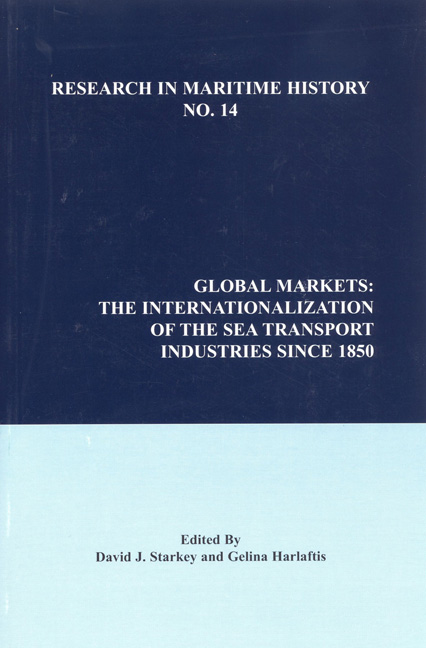Book contents
- Frontmatter
- Contents
- About the Editors
- Contributors
- Introduction
- “International Freight Markets in the 1830s and 1840s: The Experience of a Major Finnish Shipowner”
- “The First (and Very Secret) International Steamship Cartel, 1850-1856”
- “Competition or Co-operation in the Global Shipping Industry: The Origins and Impact of the Conference System for British Shipowners before 1914”
- “National Alliances and Global Webs: The Internationalization of Japanese Shipping”
- “Dutch Sea Transport in Transition: The German Hinterland as Catalyst, 1850-1914”
- “The Expansion of American Interests in Transatlantic Commerce and Trade, 1865-1893”
- “The Expansion of Japan's Shipping Interests before the Sino-Japanese War”
- “Cooperation and Reorganization on the North-South Routes from Japan in the Interwar Period”
- “The Global Communications Industry and Its Impact on International Shipping before 1914”
- “The Nineteenth-Century Roots of Globalization: Some Technological Considerations”
- “The Global Fish Market: Internationalization and Globalization, 1880-1997”
- “Convergence or National Styles? The Japanese Challenge to the British-Norwegian Hegemony in the Twentieth-Century Whaling Industry”
- “International Trends and Greek Shipping: The Business Strategy of Demetrios Moraitis, 1893-1908”
- “Organizational and Managerial Patterns of Greek- Owned Shipping Enterprises and the Internationalization Process from the Internar Period to 1990”
- “Internationalization and the Collapse of British Shipbuilding, 1945-1973”
- “Globalization and International Competitiveness: The Experience of the Japanese Shipping Industry since the 1960s”
- “Containerization and the Globalization of Liner Shipping“
“The Global Fish Market: Internationalization and Globalization, 1880-1997”
- Frontmatter
- Contents
- About the Editors
- Contributors
- Introduction
- “International Freight Markets in the 1830s and 1840s: The Experience of a Major Finnish Shipowner”
- “The First (and Very Secret) International Steamship Cartel, 1850-1856”
- “Competition or Co-operation in the Global Shipping Industry: The Origins and Impact of the Conference System for British Shipowners before 1914”
- “National Alliances and Global Webs: The Internationalization of Japanese Shipping”
- “Dutch Sea Transport in Transition: The German Hinterland as Catalyst, 1850-1914”
- “The Expansion of American Interests in Transatlantic Commerce and Trade, 1865-1893”
- “The Expansion of Japan's Shipping Interests before the Sino-Japanese War”
- “Cooperation and Reorganization on the North-South Routes from Japan in the Interwar Period”
- “The Global Communications Industry and Its Impact on International Shipping before 1914”
- “The Nineteenth-Century Roots of Globalization: Some Technological Considerations”
- “The Global Fish Market: Internationalization and Globalization, 1880-1997”
- “Convergence or National Styles? The Japanese Challenge to the British-Norwegian Hegemony in the Twentieth-Century Whaling Industry”
- “International Trends and Greek Shipping: The Business Strategy of Demetrios Moraitis, 1893-1908”
- “Organizational and Managerial Patterns of Greek- Owned Shipping Enterprises and the Internationalization Process from the Internar Period to 1990”
- “Internationalization and the Collapse of British Shipbuilding, 1945-1973”
- “Globalization and International Competitiveness: The Experience of the Japanese Shipping Industry since the 1960s”
- “Containerization and the Globalization of Liner Shipping“
Summary
The development of the world's fisheries and fish market over the last century provides a significant example of the roles of politics and economics in the international market. This chapter distinguishes between the forces of internationalization, which have characterized the fisheries throughout the period, and the forces of globalization, which have marked their development during the last twenty or thirty years.
The Concepts of Internationalization and Globalization
At the threshold of the twenty-first century, the nation state is no longer the uncontested centre of economic life. Now the main economic, political and social contrasts are increasingly between the “forces of globalization and the territorial-based forces of local resistance seeking to preserve and to redefine community.” The process of globalization is the subject of a rapidly growing body of literature. While there seems to be substantial agreement on the diminishing role of the national market as the central unit of economic life, there is less agreement on the potential counterbalancing role of the nation state and even less on the territorial basis of multinational companies.
A distinction should be made between “internationalization” and “globalization.” Internationalization by definition implies a system of companies or states which to an increasing degree interact and negotiate, but are based in a national framework. Globalization, on the other hand, denotes the process since the late 1960s whereby nation states and international organisations, including multinational companies, are superposed and transformed by non-territorial economic, informational and political networks. Globalization is an ongoing process that radically changes and undermines national and international structures as it sets free the flow of capital and jobs. Globalization goes hand in hand with territorialization, i.e., localized responses and resistance to global challenges.
Globalization may be viewed as disruptive to society and culture, but it may also be seen as liberating industry from local constraints and parochial mind sets. The state of the fisheries in the age of globalization has been deplored by writers who point to overfishing, the scrapping of ships, the decay of harbours and the loss of jobs. While these observations are true, they are only part of the global picture.
- Type
- Chapter
- Information
- Global MarketsThe Internationalization of The Sea Transport Industries Since 1850, pp. 239 - 258Publisher: Liverpool University PressPrint publication year: 1998

